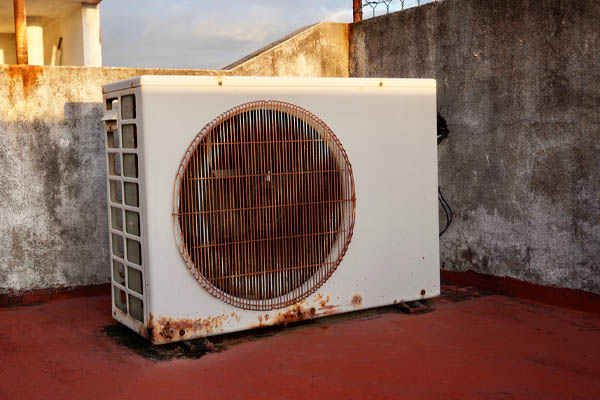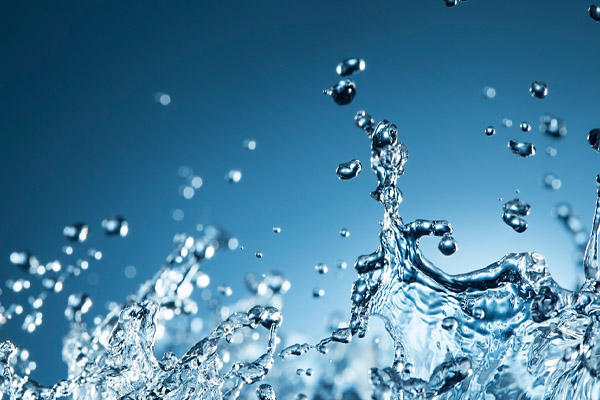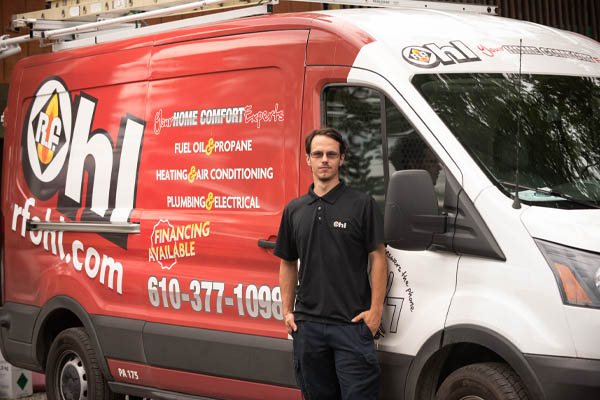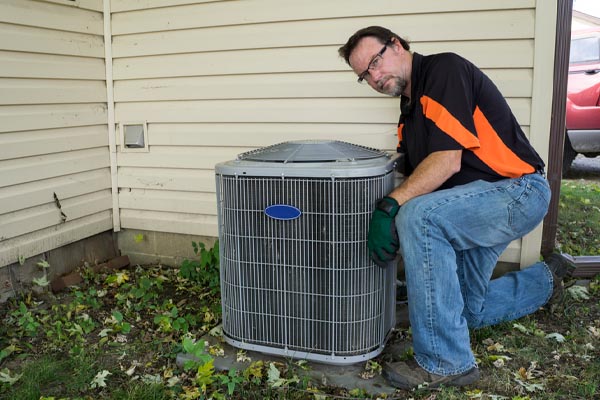Battling Rust: Insights on Protecting Your AC Condenser

Rust on air conditioner condensers significantly affects their efficiency and lifespan. It impairs condenser efficiency, disrupts heat transfer, and can cause breakdowns. This article covers the causes of air conditioner condenser rust, its impact on cooling, and prevention strategies. Knowing about condenser rust is vital for optimal A/C performance and longevity.
Air Conditioner Condenser Rust: What You Need To Know
Contents
- Air Conditioner Condenser Rust: What You Need To Know
- Contact R.F. Ohl for Expert HVAC Services
First, we’ll explore the causes of rust in outdoor units and its effects on AC performance. We’ll also discuss how professionals tackle rust removal and provide tips for future prevention.
Common Reasons for Rust Formation on AC Condensers

Rust, also known as iron oxide, occurs from a chemical reaction involving iron, oxygen, and moisture. Various elements can lead to air conditioner condenser rust, with the following being the most common:
- Moisture Exposure: Being constantly exposed to atmospheric moisture, condensers can accumulate water on their coils. If this moisture remains, it becomes a prime factor for rust development.
- Influence of Environmental Factors: Positioned outdoors, condensers are susceptible to the rigors of weather, including rain, snow, and extreme temperature fluctuations. These conditions can hasten the rusting process.
- Corrosive Settings: Installation of air conditioner condensers in areas with elevated pollutant levels, chemical exposure, or near saltwater significantly raises the risk of rust development.
- Neglect in Maintenance: Inadequate or sporadic upkeep can lead to the buildup of grime, debris, and moisture on the condenser, fostering a setting ideal for rust formation.
- Physical Damage: Damage to the condenser, like dents or scratches, can impair its protective layer, exposing the underlying metal to an increased risk of rusting.
How Rust Influences Your Air Conditioning System’s Performance
Rust significantly undermines the cooling efficiency of AC systems in several ways:
- Impaired Heat Exchange: Rust on AC unit condenser coils forms an obstructive layer, disrupting the interaction between the circulating air and the refrigerant within. This rust layer essentially acts as an insulator, hindering the condenser’s ability to expel heat efficiently. Consequently, this leads to a diminished cooling capacity.
- Disrupted Airflow: Rust can warp or block the condenser’s fins or blades, restricting air movement over the coils. This impediment lessens the system’s heat dissipation capacity, thereby hampering its ability to maintain set temperatures effectively.
- Increased System Strain: The repercussions of rust on heat transfer and airflow lead to the AC system operating for extended periods under greater stress to deliver the required cooling. This results in higher energy consumption and heightens the risk of system malfunctions or breakdowns due to the additional load.
- Reduced System Longevity: The advancement of rust speeds up the corrosion process, inflicting lasting damage on the condenser. The structural strength of the coils and other components is compromised by rust, consequently shortening the lifespan of the entire cooling system.
Professional Approach to the Removal of Air Conditioner Condenser Rust

Addressing air conditioner condenser rust demands meticulous care and specific procedures to prevent additional damage. Engaging skilled HVAC professionals is crucial, as they possess the necessary knowledge and equipment to undertake this task safely and efficiently. DIY attempts at rust removal could exacerbate the problem or pose safety risks. Below is a summary of the methods an HVAC company might employ to tackle rust on your AC condenser:
- Detailed Inspection: The process begins with a comprehensive evaluation of the condenser unit by the HVAC technician. This inspection is crucial to determine the rust’s severity and whether it has led to any structural or functional compromises.
- Rust Treatment: Based on the extent of the rust, the HVAC specialist may apply various methods for rust remediation. Techniques could include the use of specialized rust-removing solutions, rust converters, or abrasive methods. This stage demands precision and skill to ensure the delicate parts of the condenser are not damaged during rust removal.
- Application of Protective Coating: Post rust removal, the technician applies a protective layer of paint to the condenser. This coating serves as a shield against moisture and environmental elements, greatly reducing the risk of future rust development.
- Comprehensive Component Check and Replacement: The contractor conducts an in-depth examination of the condenser’s internal parts to assess any rust-induced damage. In cases where components like coils or fins are extensively affected, they may suggest replacements to restore the system’s efficiency and effectiveness.
- Guidance on Maintenance and Preventive Measures: Finally, the technician will advise on routine maintenance practices to avert rust recurrence. These recommendations typically include consistent cleaning, periodic inspections, and ensuring proper drainage to limit moisture buildup.
Effective Strategies to Prevent and Minimize the Effects of Rust
Adopting proactive measures can significantly diminish the likelihood of rust development and its adverse impact on your air conditioner’s functionality and lifespan. Consider these effective strategies to avoid air conditioner condenser rust:
Consistent Air Conditioner Maintenance
Ensure regular cleaning of the condenser coils and fins to eliminate accumulated dirt, debris, and other substances that could retain moisture, thereby hastening rust formation. Utilize a soft brush or vacuum for gentle removal of this buildup. For optimal results, consider engaging an HVAC technician for a thorough and professional cleaning to guarantee the task is performed effectively.
Proper Air Conditioner Drainage
Regularly check and maintain the condensate drain lines to ensure they are clear and functioning efficiently. Hiring an HVAC professional for this task can ensure proper drainage, which is essential in preventing water accumulation near the condenser and thus reducing rust risk.
Application of Protective Coatings
Use corrosion-resistant sprays or protective coatings on the condenser’s metal surfaces to create a moisture-resistant barrier, helping prevent rust. It’s advisable to consult an HVAC expert to identify the most appropriate coatings or treatments for your specific type of condenser.
Installation of Shelter or Enclosure for AC Systems
Consider setting up a shelter or enclosure to shield the condenser unit from the direct impact of severe weather elements like rain, snow, or intense sunlight. This approach can significantly curtail moisture buildup, extending the unit’s service life. However, it’s crucial to consult an HVAC expert to ensure that the shelter does not impede the unit’s necessary airflow, which is essential for its efficient operation.
Regular AC Maintenance Checks

Regularly arrange for HVAC professionals to service your AC unit. These visits should include inspecting the condenser for rust or corrosion, with subsequent repairs as needed. Technicians can thoroughly clean the coils and offer advice to avert future rust issues.
Strategic Installation Location
When installing your air conditioner, select a site that minimizes exposure to corrosive settings, such as high-pollutant areas or regions with chemical exposure or saltwater.
Immediate Response to Rust Signs
Act swiftly if you observe any corrosion or air conditioner condenser rust. Contact an HVAC specialist to repair or replace the affected parts, which is crucial to prevent further deterioration and avoid possible system breakdowns.
Conclusion
Tackling air conditioner condenser rust is key for optimal performance and longer lifespan. Rust severely affects heat transfer, airflow, and cooling efficiency. While DIY methods are useful, the expertise of HVAC professionals is crucial for safe and effective rust removal. They expertly assess rust damage, conduct repairs, and offer preventive advice. Relying on HVAC specialists ensures careful handling of your condenser, reducing further damage risks and enhancing system efficiency and longevity.
Contact R.F. Ohl for Expert HVAC Services
R.F. Ohl is a leading HVAC service provider in Northeastern Pennsylvania, offering expert solutions in tune-ups, repairs, installations, and replacements. Our professionally certified technicians are dedicated to delivering superior services to every client.
Understanding the importance of a comfortable, energy-efficient home, R.F. Ohl provides affordable services designed to enhance your comfort and reduce energy costs. Whether you need a repair or a system upgrade, our experienced technicians will recommend the best options within your budget. We guarantee satisfaction with our work. For an appointment, contact R.F. Ohl. We offer free in-home estimates to guide your HVAC decisions.
Click here to contact us today or give us a call at (610) 377-1098 if you have any questions. Click the link to view our service area.

Related Articles: